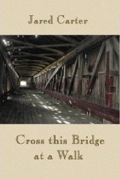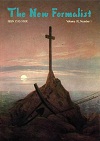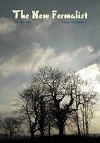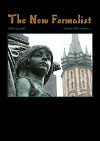From Crow(s)
I
I think that I shall never know
A bird as raucous as a crow.
In crows begins responsibility.
Little Crow, who made thee?
II
That dust of snow
From a hemlock tree
A lonely crow
Shook down on me
Has given my skull
A cold white halo:
A winter tableau
In chiaroscuro.
III
Crows don’t return in the spring
To raise our spirits;
They hunker down all winter,
Emblems of our limits.
(Blue Unicorn)
When You Told Me . . .
When you told me you were leaving
The day before our vows,
I never felt such bliss,
Like I was Lazarus.
When almost wed became new freed,
I kept my grin inside;
I heard you list ways I fell short
In tones from chill to snide,
But never did I show my joy,
For fear you’d change your mind
And re-engage with me,
Who’d left for milder clime.
(Light: A Quarterly of Light Verse)
Death, Be Proud
Death, be proud as hell, for you are mighty
and dreadful, for you have the final trump.
When you call my bluff, I may think of some-
thing to delay showing my pair of treys,
but you’ll claim my stake inevitably.
Then I’ll get no new deal, no salvation;
for me there shall be no resurrection
even if I repent and mend my ways.
I am slave to fate, chance, muggers, drive-bys
and dwell with ebola and e-coli;
and drugs can only counterfeit your strength
and, like sleep, from them I’ll awake at length.
Once you knock me out, there’ll be no reprieve,
And I shall be no more: Death, you shall live.
(The Chariton Review & The Art of Writing & Others)
Love without Sex
How do they do it, the oneswho make lovewithout love?—Sharon Olds
Love without sex
can make nervous wrecks
of couples in amorous contexts.
They seem struck by a hex
that blocks their connection
from taking a sexual direction.
When passion attacks,
it precludes relax-
ation, for the lovers still back
off from rank copulation,
stretched on the rack
of Platonic rejection.
And yet love without sex
prevents worse eventuations,
as in Abelard’s interdiction
by Heloise’s clan, who vengefully ex-
cised his testes. If only his texts
alone had stood for his erections.
So learn to love love without sex
and you’ll escape such dire correction;
divert Eros from fatal attraction
lest you climax like Oedipus Rex.
(Timber Creek Review & The Art of Writing & Others)
Another Art
(After Elizabeth Bishop)
The art of writing isn’t hard to teach:
Tell your students to welcome the blank page,
To pick a subject well within their reach.
“Put your words in the best order,” you beseech;
“Be clear as glass and cogent as a sage.”
The art of writing isn’t hard to teach.
“Moreover, make each sentence seem to reach
“From one to another as you engage
“With a subject that’s well within your reach,
“With a well-developed paragraph on each
“topic. Just let mind and fingers engage.”
The art of writing’s not so hard to teach.
Still, some may balk like mules that need a switch,
And some may doodle or dawdle in a daze,
Wanting a subject well within their reach.
And when their work’s so banal that you blanch
And brace yourself from boiling into rage,
Tell yourself, “Writing is not hard to teach—
It only seems beyond my students’ reach.”
(The Neovictorian/Cochlea & The Art of Writing & Others)
Culling
Dozens of small apples rot in a mound
amid their family trees, moth damaged
fated never to mature.
I pick them off the grass or off the tree
after spotting frass of larvae and toss
host and pest onto the pile.
As I work, my spider’s mind spins images
that I shall add to my pile of poems,
to ripen or to rot.
Such culling is the rule of life, of art;
to keep is easy, to discard is hard.
(Whole Notes & Grounded)



